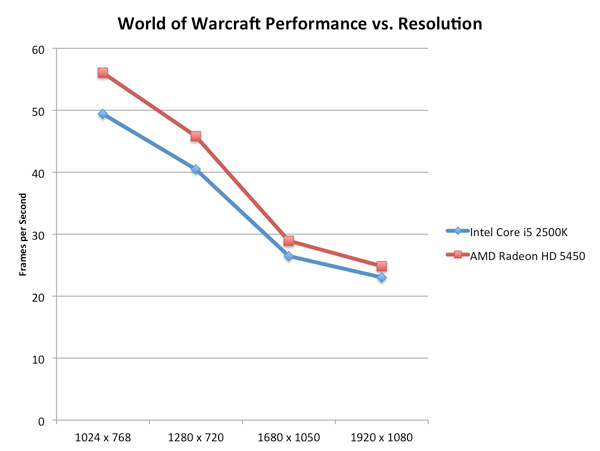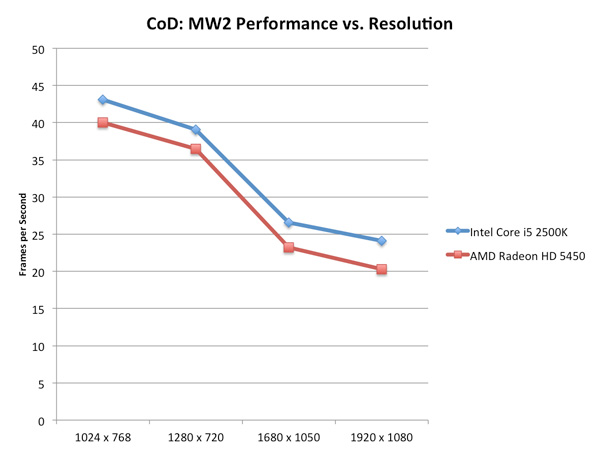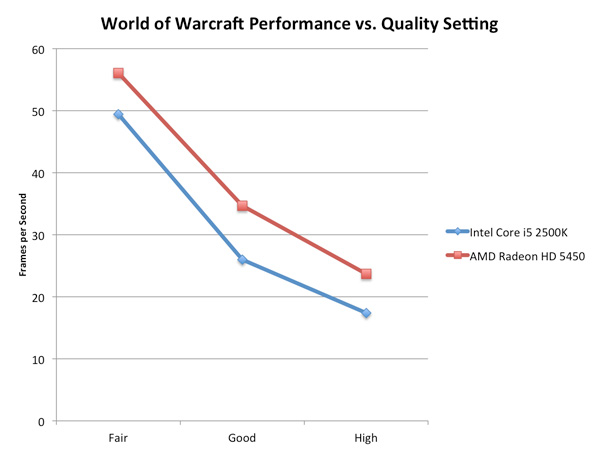The Sandy Bridge Review: Intel Core i7-2600K, i5-2500K and Core i3-2100 Tested
by Anand Lal Shimpi on January 3, 2011 12:01 AM ESTResolution Scaling with Intel HD Graphics 3000
All of our tests on the previous page were done at 1024x768, but how much of a hit do you really get when you push higher resolutions? Does the gap widen between a discrete GPU and Intel's HD Graphics as you increase resolution?
On the contrary: low-end GPUs run into memory bandwidth limitations just as quickly (if not quicker) than Intel's integrated graphics. Spend about $70 and you'll see a wider gap, but if you pit Intel's HD Graphics 3000 against a Radeon HD 5450 the two actually get closer in performance the higher the resolution is—at least in memory bandwidth bound scenarios:

Call of Duty: Modern Warfare 2 stresses compute a bit more at higher resolutions and thus the performance gap widens rather than closes:

For the most part, at low quality settings, Intel's HD Graphics 3000 scales with resolution similarly to a low-end discrete GPU.
Graphics Quality Scaling
The biggest issue with integrated and any sort of low-end graphics is that you have to run games at absurdly low quality settings to avoid dropping below smooth frame rates. The impact of going to higher quality settings is much greater on Intel's HD Graphics 3000 than on a discrete card as you can see by the chart below.

The performance gap between the two is actually its widest at WoW's "Good" quality settings. Moving beyond that however shrinks the gap a bit as the Radeon HD 5450 runs into memory bandwidth/compute bottlenecks of its own.










283 Comments
View All Comments
Rick83 - Monday, January 3, 2011 - link
I just checked the manual to MSI's 7676 Mainboard (high-end H67) and it lists cpu core multiplier in the bios (page 3-7 of the manual, only limitation mentioned is that of CPU support), with nothing grayed out and overclockability a feature. As this is the 1.1 Version, I think someone misunderstood something....Unless MSI has messed up its Manual after all and just reused the P67 Manual.... Still, the focus on over-clocking would be most ridiculous.
Rick83 - Monday, January 3, 2011 - link
also, there is this:http://www.eteknix.com/previews/foxconn-h67a-s-h67...Where the unlocked multiplier is specifically mentioned as a feature of the H67 board.
So I think anandtech got it wrong here....
RagingDragon - Monday, January 3, 2011 - link
Or perhaps CPU overclocking on H67 is not *officially* supported by Intel, but the motherboard makers are supporting it anyway?IanWorthington - Monday, January 3, 2011 - link
Seems to sum it up. If you want both you have to wait until Q2.<face palm>
8steve8 - Monday, January 3, 2011 - link
so if im someone who wants the best igp, but doesn't want to pay for overclockability, i still have to buy the K cpu... weird.beginner99 - Monday, January 3, 2011 - link
yep. This is IMHO extremely stupid. Wanted to build a PC for someone that mainly needs CPU power (video editing). An overclocked 2600k would be ideal with QS but either wait another 3 month or go all compromise...in that case H67 probably but still paying for K part and not being able to use it.Intel does know how to get the most money from you...
Hrel - Monday, January 3, 2011 - link
haha, yeah that is stupid. You'd think on the CPU's you can overclock "K" they use the lower end GPU or not even use one at all. Makes for an awkward HTPC choice.AkumaX - Monday, January 3, 2011 - link
omg omg omg wat do i do w/ my i7-875k... (p.s. how is this comment spam?)AssBall - Monday, January 3, 2011 - link
Maybe because you sound like a 12 year old girl with ADHD.usernamehere - Monday, January 3, 2011 - link
I'm surprised nobody cares there's no native USB 3.0 support coming from Intel until 2012. It's obvious they are abusing their position as the number 1 chip maker, trying to push Light Peak as a replacement to USB. The truth is, Light Peak needs USB for power, it can never live without it (unless you like to carry around a bunch of AC adapters).Intel wants light peak to succeed so badly, they are leaving USB 3.0 (it's competitor) by the wayside. Since Intel sits on the USB board, they have a lot of pull in the industry, and as long as Intel wont support the standard, no manufacturer will ever get behind it 100%. Sounds very anti-competitive to me.
Considering AMD is coming out with USB 3.0 support in Llano later this year, I've already decided to jump ship and boycott Intel. Not because I'm upset with their lack of support for USB 3.0, but because their anti-competitive practices are inexcusable; holding back the market and innovation so their own proprietary format can get a headstart. I'm done with Intel.